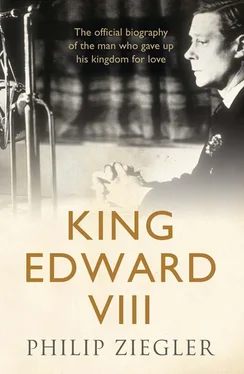In June 1915 the Prince had first speculated about the possibility that a Guards division might be formed under the command of Lord Cavan, ‘an ideal state of things’. 105A month later the ideal became reality; ‘It ought to be the finest division in the world,’ the King wrote proudly. 106The Prince had no doubt that this was where he belonged. In his eyes the Guards were as far above the other line regiments as the Navy was above the Army. He admitted to the King that he and the other Guards officers were apt to think that their men were the only ones of any use, ‘which is v. wrong and which one must avoid above all things, but it’s not an unnatural point of view to take really!!’ 107But though his transfer to this martial empyrean brought some relief and moved him a little closer to the fighting, it did not prove entirely satisfactory. Life at Cavan’s headquarters was no less sybaritic than in his previous postings; Raymond Asquith visited the headquarters in November 1915 and was given ‘a good dinner and an excellent bottle of champagne … the Prince of Wales was there and gave me a long and fragrant cigar’. 108Nor was the work more enlivening; a typical day in December had him devoting the morning to pursuing a missing consignment of gum boots and the afternoon to bargaining for the use of a piece of land on which to build bathing huts: ‘Heavens, the unparalleled monotony of this life!! … I shall go mad soon!!’ 109Worst of all, though he liked and admired ‘Fatty’ Cavan, he deplored the General’s reluctance to let him get near the trenches: ‘I think Fatty is going to shut me up in my glasshouse more than ever.’ 110Only a week after this entry he escaped from his glasshouse and visited the front line during a lull in the battle of Loos. The 1st Guards Brigade had charged three hundred yards across open ground towards the enemy line and had been massacred by machine-gun fire as they reached the final wire, ‘too cruel to be killed within a few yards of yr. objective … This was my first real sight of war and it moved and impressed me most enormously.’ On the way back the party had to jump into a trench to avoid a storm of shrapnel, fifty yards away the Prince’s car was damaged and his driver killed: ‘He was an exceptionally nice man, a beautiful driver and a 1st rate mechanic; it’s an absolute tragedy and I can’t yet realize that it has happened.’ 111
The Commander-in-Chief, told that the Prince had been in the car beside his driver, promptly ordered that he should return to Corps headquarters. The Prince wrote in dismay to his father. ‘What did you have me appointed to Guards DIV for? That I should be removed as soon as there is any fighting? … I can assure you it is one of the biggest blows I have ever had … My dearest Papa, I implore of you to have this most unfortunate and deplorable order from GHQ cancelled as soon as possible.’ 112French reconsidered his decision and the Prince stayed with the Guards. The King ruled, however, that his son should only go up to the front if it was ‘absolutely necessary’, otherwise Cavan would be placed in an impossible position. 113It all depended on what was meant by ‘necessary’, and the Prince eventually saw his interpretation of the word accepted: if it was necessary for the General to go to the front line it must be necessary for his staff officers to accompany him. But he was not content with what he had gained. ‘If only I could spend 48 hours in the line;’ he told his father, ‘… I should get an idea of what trench life is like, which it is absolutely impossible to do otherwise … I suppose you wouldn’t like to make permission for me to do this a form of Xmas present to me?’ 114
It had not needed the sight of the mounds of dead in front of the German lines at Loos to make the Prince doubtful of the allied strategy. The endless, hideously costly attacks, achieving nothing except at the best the occupation of a few trenches, seemed to him futile. The commanders had promised great advances, the breaking of the German line: ‘When is all this? Ask of the winds, and I call it sheer murder!!’ He had lost all confidence in French. ‘The sooner we get a new C in C the better.’ 115But when a new Commander-in-Chief was appointed it was Douglas Haig, a man as wedded to the policy of bloody attrition as ever French had been. ‘He is very unpopular,’ the Prince told Stamfordham. ‘I can’t stand the man myself, so hard and unsympathetic.’ 116Towards the end of the war he was to revise his views, and even find Haig ‘human and sympathetic’, 117but at the end of 1915 it seemed to him that the new C.-in-C. treated men ‘as mere fighting tools’, 118and that, in the Prince’s eyes, was almost the ultimate accusation.
Shortly before French departed George V came to France for one of his periodic visits to his troops. Startled by the cheering of the men the King’s horse reared, threw its rider and fell heavily on top of him. The Prince rushed to his father’s side, to find him winded and unable to breathe. Doctors arrived and pronounced that there were no internal injuries, only shock and severe bruising. It had been a lucky escape; the ground where the King fell was soft, otherwise he would have been crushed beyond recognition. 119The Prince hurried back to London with Claud Hamilton to reassure the Queen. ‘Thank God Papa is all right,’ he wrote in his diary, ‘it’s an ill wind that blows nobody any good, and little did Claudie and I think in the morning that we shd be on our way home in less than 12 hrs.’ 120
Before this episode the Prince had been in slightly bad odour at court because of his reluctance to wear some foreign medals which he had been awarded. He apologized to the King, ‘but you know how distasteful it is to me to wear these war decorations having never done any fighting and having always been kept well out of danger’. 121The sense of inferiority which he felt in the presence of fighting men was redoubled when he was flaunting honours which they had been denied. His discomfort was redoubled in mid-1916 when he was awarded the Military Cross. Lady Coke wrote to congratulate him. ‘I don’t feel I deserve it in the least ,’ the Prince replied crossly. ‘There are so many gallant yet undecorated officers who should have MCs long before me.’ 122He was promoted Captain at about the same time but got no pleasure from it ‘as I have no command’. ‘You’ll be saying to yourself “What a gloomy view of life he does take”,’ he admitted to Stamfordham. ‘Well, I fear that is the case …’ 123
He was craving for change, and when it became clear that he could not expect to stay with the Guards division when it went into the line at Ypres, he concluded that he had much better leave France altogether. He conceived the idea of visiting the allied forces in the Middle East and Kitchener agreed that a report on the defences in the Canal Zone would be of use. The King initially opposed the idea on the grounds that the danger from submarines in the Mediterranean was too great. His reluctance made the Prince’s wish to go become almost overpowering. ‘D—n the risk of … torpedoes,’ he wrote to Stamfordham, ‘it is such rot, isn’t it? But all these family fears have to be considered!’ 124The King relented, and at once the Prince began to wonder whether he was doing the right thing. ‘I do feel such a miserable worm,’ he told his uncle. ‘Of course it will be very interesting and pleasant in Egypt, but I shan’t be able to enjoy it in the least, when I know where I ought to be and where my friends are.’ 125
He suggested that Desmond Fitzgerald should accompany him as equerry. The proposal was rejected, Fitzgerald was too junior for such a role. A week before the Prince sailed, Fitzgerald was training with his regiment near Calais. The padre took a turn at throwing a hand grenade and somehow bungled it. Fitzgerald was fatally injured. It was the worst experience the Prince had suffered during the war. ‘It is a fearful blow to lose one’s greatest friend, and he was that to me.’ 126In wartime those whose friends are in daily danger must either learn to accept their loss with relative equanimity or themselves break under the strain. The Prince had built a carapace of resignation with which to confront the awful massacre of his contemporaries. Fitzgerald’s death, though, broke down his guard. He left for Egypt in a mood as depressed as he had ever known, and the tragedy was to cast a blight over what would otherwise have been a pleasant escapade.
Читать дальше












